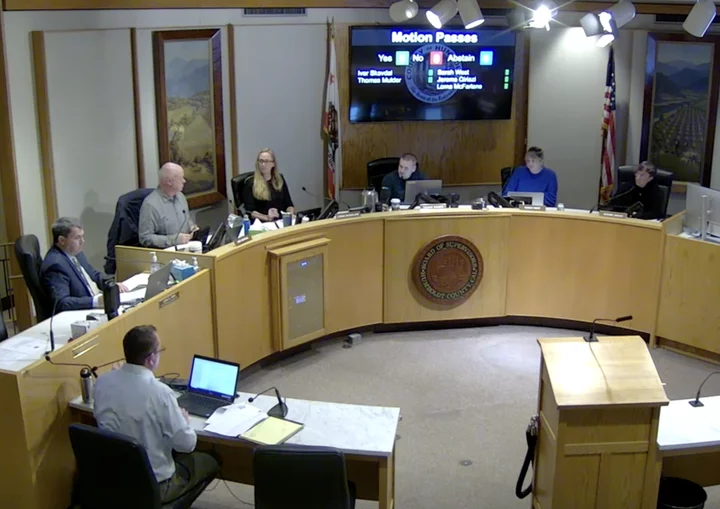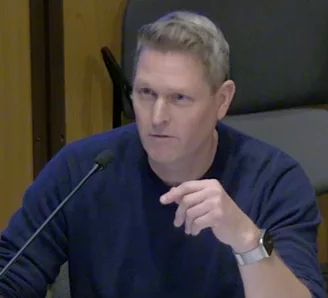Screenshot of Thursday’s Humboldt County Planning Commission meeting.
###
The Humboldt County Planning Commission on Thursday unanimously approved conditional use permits for The Hills, LLC and Shadow Light Ranch, LLC – a controversial cannabis operation located in the hills just east of Garberville – despite objections from neighbors and some members of the public who believe the project violates state and federal law.
The commission voted 5-0 in favor of the project, with Third District Commissioner Noah Levy and Fifth District Commissioner Peggy O’Neill absent.
The project application, submitted by Garberville resident Joshua Sweet in 2016, includes 60,940 square feet of existing cannabis cultivation (50,940 square feet of outdoor and 10,000 square feet of mixed-light cultivation), a proposed 10,080 square-foot wholesale nursery to support on-site operations, a 13,472-square-foot processing facility and roughly 5,184 square feet for employee housing.
The proposed project also includes the decommissioning and restoration of three unpermitted ponds that were at the center of a legal dispute with the California Water Boards and California Department of Fish and Wildlife (CDFW). Earlier this year, Sweet agreed to pay $1.75 million – $500,000 to the Division of Water Rights, $175,000 to the North Coast Water Board, $75,000 to CDFW and another $1 million for remediation work – for “diverting water from illegal onstream reservoirs without first obtaining permits required” through the state.
At Thursday night’s meeting, Sweet reassured commissioners that the state-mandated mitigation measures “are already in play,” adding that the three ponds are “no longer there.”
“We’ve been in negotiations with the water board for … eight years now [and] an enormous amount of work has gone into this,” he said. “There is some wetland restoration program that has to happen in the next two years, but other than that it is resolved. There’s a few culverts that have to go in as well, but pretty much 90 percent of it is taken care of and 100 percent of it is negotiated and done. So there’s no more need to hash out anything between the agencies and myself, I feel like we’re getting along now and things should be moving forward smoothly.”
Even so, the cannabis cultivation project has drawn criticism from some residents along Wallan Road, a primary access point to the 560-acre property, who worry about increased traffic along the narrow county road.
“[T]he biggest concern is the use of Wallan Rd as an access,” according to a letter submitted by Agnes and David Patak. “There are places on the road where it’s beyond potholes and no matter how many times you fill them they don’t last and just become worse. It is only a one lane road and cannot handle anymore traffic. They propose to build housing which takes big trucks to deliver the supplies. THIS IS NOT A COMMERCIAL ROAD FOR COMMERCIAL USE!!!”
County staff convened a neighborhood meeting at the end of last month to discuss the project with folks living near the project site. As expected, the conversation centered around traffic impacts on Wallan Road.
“[It] is a county-maintained road and has nothing to do with me,” Sweet said. “During that public meeting, I point-blank asked everyone ‘Do any of you know which cars are associated with my project or not?’ and not one person could say. So, basically, they were unaware of … who was doing what and when. I had already implemented the program to send heavy equipment [and] delivery trucks … around the back road, so the traffic that they’re talking about is not me. It’s an accumulation of 45 different parcels, five cannabis companies and four heavy equipment operator companies.”
During the discussion, Planning Manager Cliff Johnson acknowledged the recent appellate court ruling that determined cannabis is illegal in California “because federal law says so.” The shocking determination emerged from a lawsuit – JCCrandall LLC v. County of Santa Barbara – over the legality of transporting an illegal product on a private easement without explicit permission from the property owner.
“It’s the county’s position that that court case is not applicable to the situation in Humboldt County,” Johnson said. “[Santa Barbara] County’s land use development code requires that the county must find that the streets and highways are adequate and properly designed to carry the type and quantity of traffic generated by the proposed use. … That’s a different situation than what occurs in Humboldt County.”
All three speakers who spoke during the public comment portion of Thursday’s hearing brought up the recent state appellate court decision and asserted that the Planning Commission would be breaking the law if it approved the permit.
“You cannot approve a conditional use permit for cannabis – particularly to transport cannabis – because by approving this permit without consent [of neighboring landowners], you are forcing [them] to violate a federal law,” said one commenter, who did not identify herself. “And in that case, the court clearly says that cannabis is illegal under federal law … regardless [of] what California wants to believe. … This is the law of the land right now [in] California, and in the Supremacy Clause that’s all that counts.”
Another commenter, who did not identify himself, noted that the county’s position on the easement issue “is clearly at odds with the decision made by the appellate court” and, like the previous speaker, urged the Planning Commission to deny the project.
“It doesn’t really matter what ordinance – or any other doctrine or document – that the county has talking about easements; it cannot trump the federal law,” he said. “If the commission chooses to thumb its nose at this decision, it’s going to be on record and it’s going to come back to bite the county later on … and I don’t think the taxpayers really want to be putting up more money to fight legal situations that could have been averted by a simple Planning Commission decision saying, ‘Hey, look, this isn’t right.’”
Appearing via Zoom, Deputy County Counsel Joel Campbell-Blair said the county is still trying to figure out “what it all means,” given that the ruling was issued less than a month ago and is being appealed by the County of Santa Barbara.
“When the state issues permits, it doesn’t apply to us and, therefore … it doesn’t have the force of law,” Campbell-Blair explained. “The state has not stopped issuing permits. They don’t feel like that applies to them either. We’ll kind of see where it goes … but I would just maybe warn or caution everybody not to over-apply the case. You know, when judges make law, they make law only as to the issue that was right before them, and that was [the case with] the Santa Barbara County code provision.”
Commission Chair Thomas Mulder asked about transporting cannabis on forest service roads, which are federally maintained. “I do recall that there are some projects out there we’ve approved that use forest service roads, and there’s a direct comment from the U.S. Forest Service if memory serves, that says it’s federally illegal and they don’t support it,” Mulder said. “This isn’t the first time federal illegality has been referenced in regards to accessing a project, is that correct?”
Early in the statewide permitting process, Planning and Building Director John Ford said the county adopted a policy that it would not “approv[e] the use of the road” for cannabis transport. Instead, the property owner would be responsible for “taking the risk.”
Fourth District Commissioner Jerome Qiriazi noted that the Planning Commission is “not approving [the] transport of cannabis, we’re approving production.”
At-Large Commissioner Sarah West acknowledged concerns raised during public comment but emphasized that she and other commissioners are not lawyers and, as such, rely on county counsel’s legal expertise. “They are the expert in this situation … so I will be depending on them for their legal interpretation.”
After a bit of additional discussion, First District Commissioner Iver Skavdal made a motion to approve the project and associated permits. Qiriazi offered a second but asked to amend the motion to correct a couple of small inaccuracies in the mitigated negative declaration (MND) for indigenous artifacts. Skavdal agreed and the motion was approved 5-0.
###


CLICK TO MANAGE